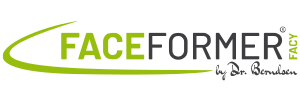FaceFormer® at night in addition to CPAP?
Question
We will be using the FaceFormer from tomorrow. Reason: facial nerve paresis on the left and therefore incomplete lip closure as well as a flaccid velum, etc., swallowing problems and since May, my husband has been diagnosed with moderate sleep apnoea. The complaints occurred after a haemorrhage at the brain stem (pons).
We read today that after 2-3 weeks the FaceFormer should also be worn at night. My husband currently has an auto CPAP with a nasal mask. Is it still possible/sensible to use the FaceFormer at night in addition to the CPAP?
Answer
To have a positive influence on facial paresis, the FaceFormer should definitely be used. If possible, three times a day, starting with 8 repetitions per exercise and continuing with 20 repetitions after approx. 3-6 days. Countless patients also use the FaceFormer successfully against sleep apnoea. Compared to CPAP treatment, which is a purely symptomatic treatment, FaceFormer therapy aims to treat the causes. Slack muscles and tissue are strengthened and new correct movement patterns are learned. However, once your husband has been fitted with CPAP, all follow-up examinations in the sleep laboratory will only be carried out with CPAP equipment.
This means that you will no longer know anything about the effect of FaceFormer therapy on breathing cessation. Accordingly, your husband must decide for himself what he wants. In the case of moderate sleep apnoea, CPAP can certainly be dispensed with quickly if the FF training is carried out intensively and correctly over several weeks. However, the success is unfortunately no longer measured – at the expense of the health insurance companies. In this respect, many CPAP users stick with their method until they can’t stand it any more. If I were to recommend FF therapy for sleep apnoea and your husband’s health were to deteriorate in any way, the reason for not using CPAP would be a welcome argument. If, on the other hand, something happens despite CPAP, the conclusion would be that your husband was already ill anyway and unfortunately CPAP could not change anything.
With regard to night-time use, we cannot make any recommendation. Of course, the FaceFormer can be used together with CPAP if your husband only wears a nasal mask. However, the success that is supposed to occur with FaceFormer therapy would never be optimal. Against the facial paresis, however, the daily training programme is also absolutely recommended. The central respiratory centre is located in the pons and damage can therefore affect the entire respiratory system. If such a problem existed, neither CPAP nor FaceFormer therapy would be adequate help. But this is probably – thank God – not the case.
